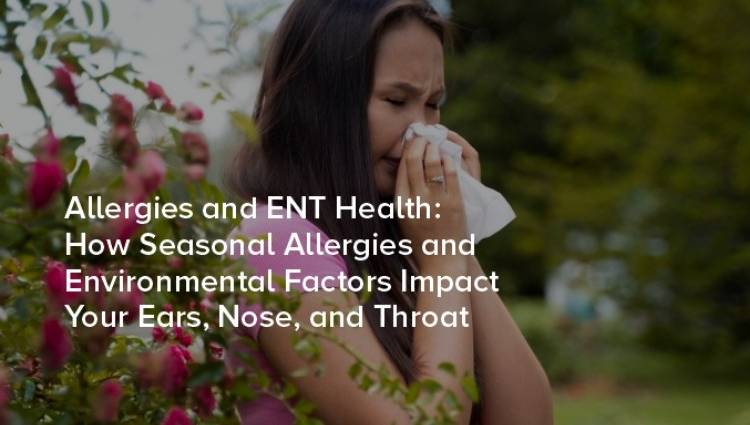
Allergies can affect various parts of our body, including the eyes, skin, respiratory system, and digestive system. However, allergies can also have a significant impact on our ear, nose, and throat (ENT) health. The ear, nose, and throat are interconnected and are susceptible to environmental factors and seasonal allergies. Unaddressed allergies can result in chronic sinusitis, ear infections, or other ENT-related issues.
How allergies affect the ears?
Allergies can cause inflammation in the Eustachian tube, which connects the middle ear to the back of the throat. The blockage of the Eustachian tube can lead to pressure build-up, causing temporary hearing loss, or in severe cases, chronic hearing loss. Additionally, allergies can cause fluid build-up in the middle ear, resulting in ear infections. If left untreated, chronic ear infections can cause permanent hearing loss. Therefore, it is crucial to seek medical attention if you experience any ear-related issues during allergy season.
How allergies affect the nose?
Allergies can cause inflammation in the nasal passages, making it harder to breathe through the nose. Additionally, nasal inflammation can lead to sinusitis, a condition that causes pressure and pain in the sinus cavities. Sinusitis can cause headaches, facial pain, and tooth pain, making it difficult to go about your daily routine. In severe cases, sinusitis can lead to the formation of polyps- non-cancerous growths in the nasal cavity. Polyps make it difficult to breathe, inhibit your sense of smell, and result in chronic sinus infections.
How allergies affect the throat?
Allergies can irritate the throat, resulting in a sore and scratchy throat. Allergy-related postnasal drip can cause throat irritation and coughing, making it hard to sleep and focus on daily activities. Additionally, allergies can exacerbate existing ENT issues like tonsillitis, laryngitis, and other throat infections.
Environmental factors and ENT health?
Apart from seasonal allergies, environmental factors can also have an impact on your ENT health. Exposure to airborne irritants like pollution, dust, and smoke can cause inflammation in the respiratory system. Elevated levels of pollution can make conditions like asthma and allergies worse by triggering inflammation in the airways. Similarly, exposure to chemicals like industrial solvents, insecticides, cleaning agents, and tobacco smoke can also irritate the nasal passages and respiratory system.
Prevention and treatment:
Prevention is key when it comes to avoiding allergy-related ENT issues. Regularly maintaining indoor air quality by changing air filters, using a dehumidifier, and avoiding harsh chemicals can help prevent allergy and sinus-related issues. Additionally, over-the-counter antihistamines and decongestants can help alleviate allergy symptoms. However, if you experience severe allergy symptoms that interfere with your daily routine, seek medical attention. Your healthcare provider may recommend allergy shots, prescription allergy medication, or other treatment options to manage your allergy-related ENT issues.
Conclusion:
In conclusion, allergies can have a significant impact on your ear, nose, and throat health. Allergies can cause inflammation in the respiratory system, leading to various ENT-related issues like hearing loss, sinusitis, throat irritation, and coughing. Environmental factors like pollution, dust, and smoke can also irritate the ENT system, exacerbating existing allergies, and ENT issues. Therefore, it is crucial to take preventive measures like maintaining indoor air quality and seeking medical attention if you experience severe allergy-related symptoms. Remember, keeping your allergy-related ENT issues under control can result in a better quality of life and overall well-being.